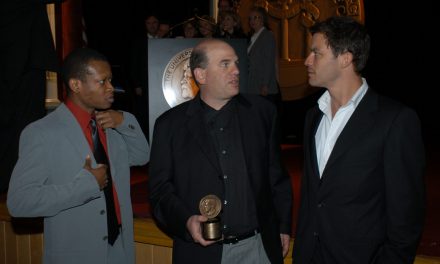 Like Proust and his madeleine, the simple act of eating in Anthony Bourdain’s television shows usually became an occasion for memory.
Like Proust and his madeleine, the simple act of eating in Anthony Bourdain’s television shows usually became an occasion for memory.
Whether it was over mohinga in Yangon, egusi soup in Lagos, or clams at the Jersey shore, sharing a meal with Bourdain often became a portal to the past: to one’s childhood; to memories of family and community; a moment to reflect on local rituals, traditions, and to the consequences of violence and social change for everyday life.
In other words, in Bourdain’s anthropology, food was the gateway to a thicker description.
Like many others in the wake of Bourdain’s suicide earlier this month, I’ve found myself cycling through old episodes of No Reservations (Travel Channel, 2005-2012) and Parts Unknown (CNN, 2013-2018). Though I’ve seen many of these episodes before, and though I thoroughly enjoyed listening to the audio version of his famous book Kitchen Confidential (2000) (he reads it himself – always a plus), his shows were never really appointment viewing for me. They were always something I told myself I’d binge at some point, but I’m only now getting around to it. The experience has been bittersweet.
On the one hand, it has been easy to see how Bourdain’s unpretentious, at times irreverent and self-effacing style appealed to so many of his fans. He was nothing, it seemed, if not himself – charming, blunt in his opinions, conscious (if not contemptuous) of the artifices of television, and above all, genuinely empathetic and curious about the people and places he encountered.
On the other hand, moments like Bourdain’s conversation with his friend Eric Ripert about mortality and the afterlife in Marseilles, or his confession to a psychotherapist in Buenos Aires of his feelings of isolation and unhappiness give one pause. His characteristic fatalism, once perhaps read as a marker of his authenticity, or a deep concern with human suffering, now takes on a different, portentous meaning.
To reiterate what’s been said countless times over the past few weeks, Bourdain’ suicide should attune us to the ways in which we talk about mental health, both in our own lives and as a matter of public policy (though I remain pessimistic that this last part will take any meaningful shape in the U.S. if current circumstances persist).
But Bourdain’s television oeuvre is also a celebration of life – an exploration of the commonalities of the human experience inasmuch as it is about our cultural differences.
What has struck me as I rediscover Bourdain’s back catalogue is the way in which this exploration is structured by layers of history and memory.
With telescoping perspectives, we are typically introduced to locations and to communities in each episode through references to larger historical contexts – the movement of people, the outbreak of war, the disruption of ecosystems, the collapse of governments, and often (and this is the key to the politics of Bourdain’s approach), the oppression of one social group by another.
These are historical pasts that we are told. It is a past that appears to us through the usual TV techniques for signifying past-ness: wide establishing shots, montage, archival footage and news clips.
But as each episode plays out, we are also shown this past through Bourdain’s conversations with his hosts. It is a living past – personified by individual optimisms, anxieties, pleasures, and tragedies. It is a past expressed in answers to a question that seems to be of perennial interest to Bourdain: What’s changed?
Consider Hanoi.
Bourdain visited the Vietnamese capital in the premier episode of season 8 of Parts Unknown. It’s a city that for many Americans conjures up memories of war, brutality, and trauma, and of the deepening rifts in U.S. politics that still persist today. Indeed, the episode even opens with a quote from The Quiet American, a reference to Graham Greene’s novel that was in part about the naiveté of U.S. adventurism in southeast Asia.
But while the history and memory of the U.S.-Vietnam war – and of French colonialism for that matter – remains an unavoidable presence in the episode, it is not all-encompassing. Bourdain seems more interested in showing how the country has changed over the past two decades, the friendliness of its people, the pleasures of its cuisine, and, ironically, the emergence of a market economy. With a population predominantly under 30, he notes, there are few Vietnamese who can even remember the American War.
Still, those years, Bourdain tells us “were a defining time for just about everyone, Vietnamese or American, who lived through them.” But as shots of the Hanoi War Museum and its artifacts flit by on screen, he adds, “for most Vietnamese these days, the war has become an abstraction. Not even a memory.” While this is not likely the case for his U.S. audience, where the memory of the conflict is still raw – Ken Burns’s The Vietnam War (PBS, 2017) provides examples of the war’s lingering impact on the American psyche – for many of the Vietnamese Bourdain encounters, memory seems to have a more recent – and sometimes far more ancient – focus.
Change, then, is the predominant theme of the episode – change in Communist Party economic policy, changes in the standard of living, changes in Hanoi neighborhoods that now feature luxury retail stores, changes in the ways that average Vietnamese earn a living, changes in attitudes between old enemies, and changes in U.S.-Vietnam relations – a change that is powerfully illustrated by the appearance of then-U.S. president Barack Obama, who joined Bourdain for a meal of noodles and beer.
By the end of the episode, I am left wondering about the extent to which we project our own (in this case Americentric) memories onto other places, and the consequences this has on, say, foreign policy, and our perceptions of ethnicity and national identity. But perhaps that was Bourdain’s goal all along.
100 years ago, the writer Van Wyck Brooks observed that the history of the U.S. (we could say Vietnam, or Ethiopia, or Argentina) as it exists in England is invariably different from that which Americans create for themselves. It seems to me that Bourdain’s project, in part, was to acknowledge – and by acknowledging, challenge – the way we tend to do this: To try to see the past as another sees it, while at the same time recognizing that our perspective on the past always remains our own.
Remember, Help is Just a Phone Call Away.
In the U.S. – National Suicide Prevention Lifeline: 1.800.273.8255
In Europe – International Association for Suicide Prevention
In the UK – Samaritans: 116 123
Andrew J. Salvati is a Ph.D. candidate in Journalism and Media Studies at Rutgers University, New Jersey. His research examines the relationship between past and present as it is presented in a variety of media forms and genres, including television, video games, and podcasts. His own podcast, Inside the Box: The TV History Podcast can be found here, and on iTunes. Andrew has also worked in television for over 10 years as a broadcast technician. He lives in New Jersey with his wife and two cats.





